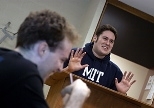The powerhouses in college football this season have been Miami and Ohio State. Top-rated teams in men's basketball include Arizona and Duke. In women's basketball, there's Duke, Kansas State, LSU and Connecticut. No surprises here.
But here's a surpise: MIT is the clear leader in parliamentary debate, "the most dominant school in the country," Patrick J. Nichols, president of the MIT Parliamentary Debate Team, said with pride. Here's another: the top debaters major in electrical engineering and computer science (EECS) and physics.
MIT has made the final round in eight consecutive American Parliamentary Debate Association (APDA) tournaments this semester, competing against Harvard, Princeton and Yale, among others. The MIT debaters have won tournaments at Vassar, Cornell, Wesleyan and Columbia and finished second at Smith, Harvard, Columbia and Brandeis. MIT plays host to the final tournament of the year Friday and Saturday, Dec. 6 and 7. For more information, contact Nichols at pnichols@mit.edu.
The team leaders are three seniors: Nichols and Adam G. Unikowsky, both majoring in EECS; and Phillipe C. Larochelle, a physics major. All three rank in the top 10 in APDA Speaker of the Year standings: Larochelle (1), Nichols (4) and Unikowsky (10). The Nichols-Larochelle tandem tops the Team of the Year rankings and Nichols-Unikowsky is fourth. Freshman Ajay D. Dave is second in Novice of the Year rankings.
"Debaters come from all walks of life, but deep down we all love arguing about things," Nichols said. "One of the nice features of a debate round is that it provides a relatively constructive way to argue about topics, and to determine who wins.
"Debate is about more than just arguing, however; it's also about delivery and rigorous analysis of arguments. In that way, it's amuch more sophisticated form of arguing, in that your style, presentation and rigor really matter."
Unlike other team members, Nichols had no previous experience in debating when he joined. His goal was to improve his public speaking performance, which he admits was "terrible" as a freshman.
"Debate has helped me gain confidence and eloquence in public speaking," said Nichols, who plans to attend law school. "I've also learned a great deal about many topics that just aren't covered in a typical MIT education. As a computer science major, I don't often get a chance to discuss constitutional law, ethics or foreign policy in class - but I'm forced to discuss these topics every weekend at tournaments."
TOURNAMENT RULES
An APDA tournament round matches two two-person teams. A Speaker serves as both the judge and arbiter of the rules. One team represents the Government, the other the Opposition. The Government team is composed of a Prime Minister, who speaks twice, and a Member of Government, who speaks once. The Opposition team comprises a Leader of the Opposition, who speaks twice, and a Member of the Opposition, who speaks once. The Government attempts to demonstrate that its case statement is correct. The Opposition argues that the Government case is not correct. The Speaker decides which argued more convincingly and declares that team the winner.
MIT has had a debate team on and off since the 1960s. Harvard University President Lawrence H. Summers (S.B. 1975) was a member as an undergraduate. The Parliamentary Debate Team was formed in 1991.
"We started becoming a force on the circuit about three years ago when MIT won its first tournament in living memory," Nichols said. "Each year since then has been more successful than the previous one."
A version of this article appeared in MIT Tech Talk on December 4, 2002.






